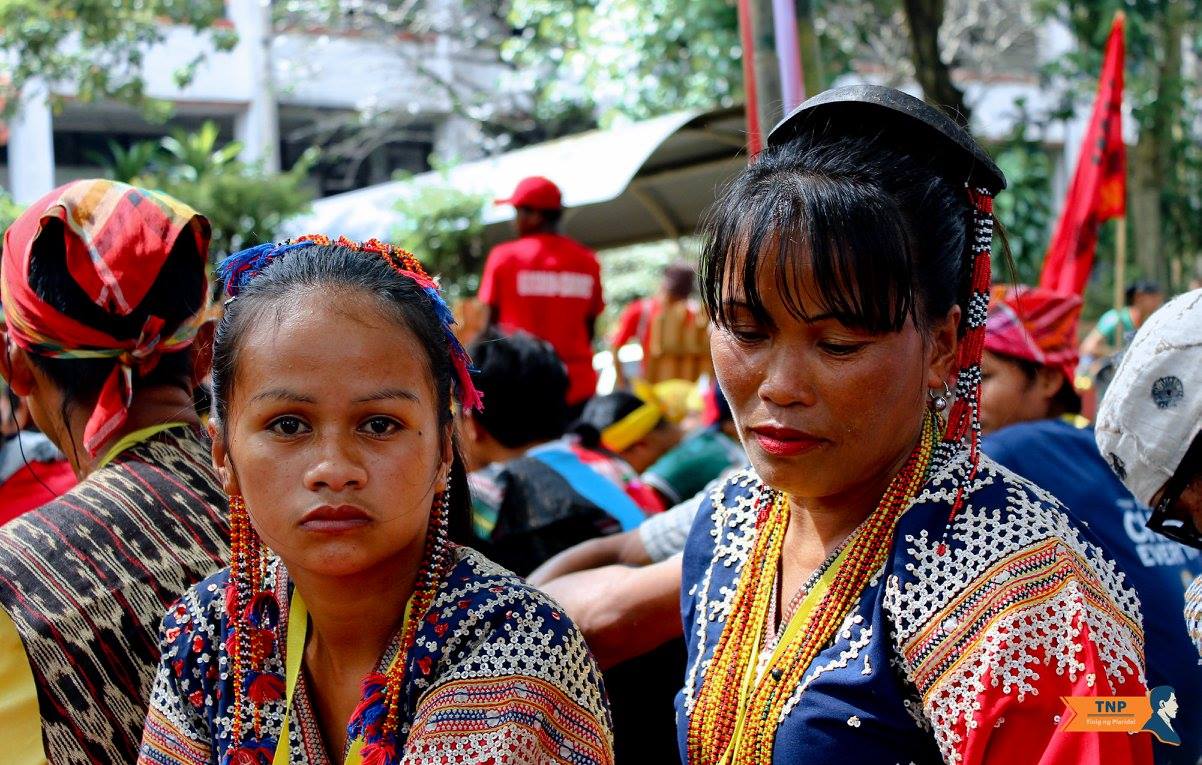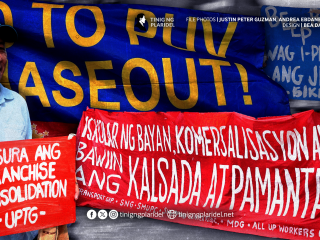by Faith Esther Brown
“Hindi mo kami maaring tawaging katutubo kung wala kaming lupa na tirahan. Mahalaga sa amin ang lupain,” Lumad leader Minda Dalinan told the audience of “At a Glance in the Philippine Tourism” forum by the Asian institute of Tourism Student Council at the School of Industrial Relations, University of the Philippines (UP) Diliman, Friday.
In line with the National Indigenous Peoples’ Month, the forum discussed the issues national minorities currently face, particularly the commercialization of their cultures and ancestral lands due to tourism, mining, and land grabbing.
KATRIBU UP Diliman Chapter’s Bernadette Almanzor pointed out that the issue of land-grabbing can be traced back when the Spanish colonizers first tried to invade the lands of the Filipino natives.
“May mga katutubo o communities na either lalo pa silang nagtago dahil ayaw nilang magpasakop o kaya aktibo nilang nilabanan yung mga colonizers,” Almanzor said. “Sila yung mga magiging katutubo o yung mga indigenous peoples at saka yung mga Moro groups.”
According to Almanzor, these groups have retained their own languages, economic systems, and socio-political structures since they deliberately protected their culture from foreigners and other invaders.
However, preserving both these and their ancestral lands have now become a tough challenge for the national minorities.
Dalinan said mining and logging companies, as well as big plantations have already invaded their ancestral land on the mountains of Mindanao.
The Lumad leader also mentioned that these companies had promised to build them free schools, health centers, and livelihood for them to consent the logging of trees and building of plantations and mining sites within their land.
However these promises never materialized.
“Hanggang sa amin ngayon wala kaming free school, walang free health center, wala ang lahat. Ngayon, niloko kami,” she said. “Patuloy nang nasisira ang kabundukan, lalo na higit sa lahat, ang aming kultura. Naging commercialized na siya.”
Dalinan added that instead of building structures for the welfare of the members of the cultural minorities in their land, these companies and corporations endangered the health of the people.
“Ang SOCCSKSARGEN sa kasaluyan ay malamang na mayaman sa kanser–kanser sa balat, kanser sa baga dahil sa epekto ng aerial spray ng Sumifru plantation. Epekto rin ng mining kasi ang tubig hindi mo na magamit kapag gamitin sa mining,” Dalinan said.
Sumifru Philippines is a corporation that produces and exports various fresh fruits based in Davao del Sur.
According to Dalinan, even their native costumes and rituals have become commercialized because of the grabbing and the destruction of lands where they get food and resources. The subsequent shortage of resources because of the invasion of their lands rendered the introduction of cash in their economic system.
Dalinan said some of the members of the minority groups sell their traditional clothes for money, which in turn become exported.
She mentioned that some natives now perform their traditional rituals for cash, which was forbidden as it strips off dignity from their culture.
“Kasi yung mga sayaw nila ay hindi naman for entertainment. Marami sa kanilang sayaw ay ritualistic–sagrado at hindi siya basta-bastang ginagawa,” Almanzor said.
“Nakikita natin na sa uri ng tourism na meron tayo ngayon, nilalabas sa sacred context o sagradong konteksto yung kanilang kultura para pagkakitaan,” she added.
Asked whether or not their tribe supports ecotourism since the current government promotes it, Dalinan answered they are not in favor of it since it inhibits them from freely going to sacred places within their land.
“Sa ngayon ayaw na rin namin dahil hindi kami makapunta sa mga lugar kung saan sacred. Lalo na ngayon, may mga tourist area na sa amin [sa] South Cotabato. Hindi ka makapunta doon kung wala kang pera na ibabayad sa gate,” Dalinan said.
According to Dalina, all of these changes in their way of life are happening because of the mining and logging companies and plantations that continue to “destroy” their land.
On the other hand, Dakula Dodoy Bago, a guest speaker and part of the Mamanwa tribe form CARAGA, recounted the harassment and killings of many tribal leaders in their area after its militarization. He blamed the mining companies for the formation of military stations in their ancestral lands.
Only five months ago, vocal tribal leader Datu Arnel Nayer from Surigao del Norte was killed by the military for opposing the seizing of their ancestral land.
Meanwhile, tribal leaders Dionel Campos and Datu Jovello Sinzo along with Alternative Learning Center for Agriculture and Livelihood Development (ALCADEV) school Director Emerito Samarca were slain by identified members of the paramilitary force in Surigao del Sur in 2015.
Kahugpungan sa mga Lumadnong Organisasyon sa CARAGA (Kasalo-CARAGA) believes that the “plunder of ancestral lands by a mining corporation” is the reason behind killings of members of minority groups in the area where they reside.
Bago and other minority group members decided to leave their land due to the mining companies as well as the military who invaded their area. They now reside in beside a highway in their town–far from what they considered home for a long time.
Due to the apparent negative effects of mining in their lands, Dalinan expressed her support for the passage of House Bill 171 or the People’s Mining Bill which was first filed in 2011.
This bill intends to develop the mining industry in the Philippines “in an economically-viable, ecologically-sound and democratic manner.” It also seeks to free the Philippine mining industry from liberalized access and pursue a “need-based” development rather than the current “export-orientation” of mining.
“Mayroon tayong mining bill na gustong isabatas pero bakit hindi pa rin naisasabatas?” the Lumad leader said. “Ang mas ini-implement pa nila ay yung mga batas na mas nakasisira pa sa kalikasan lalo na sa katawan ng tao.”
Dalinan and Bago are part of this year’s Kampuhan sa Diliman where national minority groups hold a solidarity camp at UP Diliman to integrate with students and other sectors in Metro Manila.
Kampuhan is part of Lakbayan 2016, a protest caravan conducted to bring to light the struggles faced by country’s national minority.









